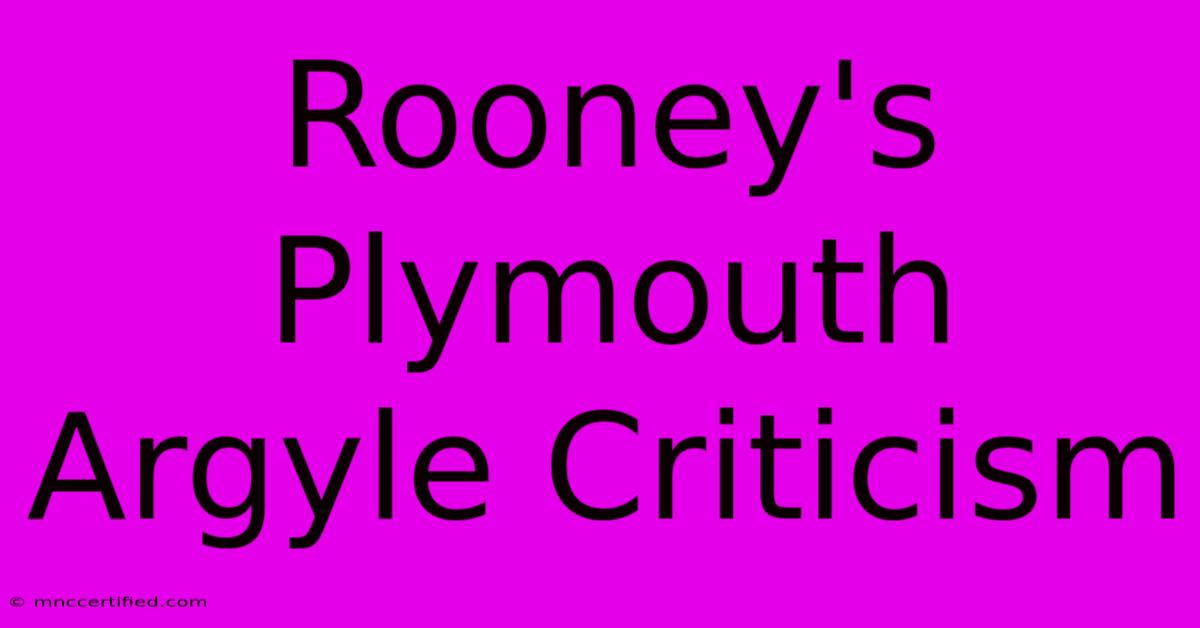Rooney's Plymouth Argyle Criticism

Table of Contents
Rooney's Plymouth Argyle Criticism: A Deeper Dive into the Derby County Manager's Comments
Wayne Rooney's tenure as Derby County manager was marked by numerous challenges, but his post-match comments following a game against Plymouth Argyle ignited a significant controversy. This article delves into the specifics of his criticism, the context surrounding it, and the subsequent fallout. We'll explore the reasons behind the criticism, analyze its impact, and examine the broader implications for both managers and the footballing world.
The Specifics of Rooney's Criticism
Following a match between Derby County and Plymouth Argyle, Rooney publicly criticized Argyle's playing style. While the exact wording varied depending on the source, the core of his complaint centered around what he perceived as overly physical and cynical play. He didn't just mention fouls; he suggested a deliberate, almost orchestrated, attempt by Plymouth to disrupt Derby's rhythm and momentum through aggressive, borderline illegal tactics. This wasn't a generic complaint about a tough game; Rooney's words suggested a level of gamesmanship he found unacceptable.
Keywords: Wayne Rooney, Derby County, Plymouth Argyle, criticism, football, playing style, aggressive tactics, gamesmanship, post-match interview
The Context: Derby County's Struggles
It's crucial to understand the context. Derby County, under Rooney's management, faced significant financial and on-field challenges. The team was battling relegation, and any perceived unfair advantage, even a subtle one, would be magnified under such pressure. This context likely fueled Rooney's strong reaction. His criticism wasn't just about the game itself; it was also about the overall fight for survival and the impact of what he saw as unfair play on his team's chances.
Analyzing the Fallout: Media Reaction and Public Opinion
Rooney's comments didn't go unnoticed. The footballing press widely reported on his statements, generating considerable debate. Some supported Rooney's viewpoint, arguing that cynical tactics have no place in the beautiful game. Others countered that such tactics are a legitimate part of the sport, especially in high-stakes matches like those involving relegation battles. The public reaction was similarly divided, reflecting the varied perspectives on sportsmanship and acceptable levels of physicality in football.
Keywords: Media reaction, public opinion, controversy, sportsmanship, football tactics, relegation battle, debate, analysis
The Impact on Plymouth Argyle and Steven Schumacher
Plymouth Argyle manager, Steven Schumacher, naturally responded to Rooney's criticism. His response ranged from defending his team's approach to suggesting that Rooney's comments were unsportsmanlike. This sparked a further exchange, adding fuel to the already heated debate. The incident highlighted the delicate balance between assertive management and maintaining professional decorum in a highly competitive environment.
Broader Implications: Fair Play and the Future of Football Management
Rooney's criticism raises important questions about fair play, the acceptable limits of physicality, and the role of managers in shaping public perception of their opponents. The incident serves as a case study for analyzing how post-match comments can impact team dynamics, public opinion, and the overall image of football. It underscores the need for managers to carefully consider their words and the potential consequences of public pronouncements.
Keywords: Fair play, football management, public image, professional decorum, case study, sports ethics, ethical considerations
Lessons Learned: Managing Public Perception
The Rooney-Plymouth Argyle controversy offers valuable lessons for managers at all levels. It highlights the importance of managing public perception, choosing words carefully, and understanding the broader implications of post-match comments. While passionate reactions are understandable, maintaining professionalism and avoiding unnecessary controversies is crucial for building a positive image and fostering respectful relationships within the football community.
Conclusion: Rooney's criticism of Plymouth Argyle's playing style sparked a significant debate about acceptable levels of physicality and gamesmanship in football. The incident provided a platform to discuss fair play, the role of managers in shaping public perception, and the importance of professional conduct within the football world. It serves as a reminder that even seemingly minor post-match comments can have wide-ranging consequences.

Thank you for visiting our website wich cover about Rooney's Plymouth Argyle Criticism. We hope the information provided has been useful to you. Feel free to contact us if you have any questions or need further assistance. See you next time and dont miss to bookmark.
Featured Posts
-
Devlins Response To Mc Gregor Accusations
Nov 28, 2024
-
Six Real Players Miss Liverpool Clash
Nov 28, 2024
-
Old Grand Dad Bottled In Bond
Nov 28, 2024
-
Bonded Pair Dogs For Adoption
Nov 28, 2024
-
Bbc Presenter Mishal Husain Departs After 25 Years
Nov 28, 2024